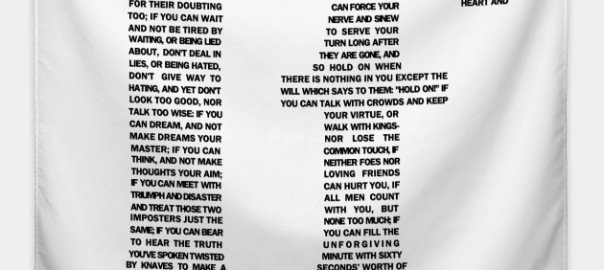If – Rudyard Kipling. An essay. – https://www.poetryfoundation.org/poems/46473/if—
In school, we read a lot of poetry. In years 7 to 11, we read war poetry, poetry about relationships and poetry about power. We read poems that mean nothing to us because we have never had the slightest inkling of care as to what they are about, their beauty is lost because we ourselves did not search it. I. Hate. Poetry. I hate reading it, I hate the way it is structured, I hate its ambiguity – but that is not poetry’s fault. It is the asinine idea that you can force poetry on a child and have them develop an interest.
I have found a poem that I love so much I am writing an essay on it out of my own heart, when I could, and really should, easily write an essay on Blake or Keats that would actually help me in my education. So why ‘If’ by Rudyard Kipling?
Well I could say that it is the message, that you should be tough, willing to face hardship and brush the chip from your shoulder. Not that you should be uncaring, stone faced and hearted, unbreakable and ice cold, no. That you should grow from your difficulty, that is what people respect. Humans automatically respect someone who breaks free of hardship with a smile on their face, a person who can take on all that pain and suffering, but keep moving forward knowing the grass is always greener on the other side.
It’s also beautiful, saying that makes me feel like a pretentious prick, but it is. The anaphora throughout the poem lends a fluid rhythm that captures the wise and whimsical father figure leaning down to his son and explaining with upmost eloquence advice that is powerful and unforgettable. The non-standard grammar in ‘If you can keep your head when all about you are losing theirs and blaming it on you’ lends a drunken slur when spoken that, for me, brings to light the idea of that perfect intellectual, the articulateness of which creates a masterful flow with words, almost to the point of sounding like smeared language, yet so far from that. The simple change in syntax elevates this piece to something that is just a pleasure to listen to, ignoring the actual meaning of the words.
Or, I could say that it’s simply the fact that it connects to me. I like the concepts, I love the way it’s spoken by a figure that I follow quite closely online. It’s the fact that I found it of my free will and that it has a personal tie to me. To me, Rudyard Kipling is a more masterful poet than Blake or Keats ever was, his language more exotic and breath-taking than any stanza in Lamia or London, probably because it isn’t forced on me. Beauty in language comes from its structure, its vocabulary, the sounds and techniques used, yes, but it also comes from the context attached to it, and whilst I agree with some of Blake’s views and like his activism in the face of authority, he has no connection to me. His poems are boring, mind numbingly so.
Rudyard speaks to authority with his metaphor: “If you can dream – and not make dreams your master, if you can think – and not make thoughts your aim” far better than Blake ever did in any of his poems because it is a timeless relation to personal authority that connects more powerfully with me given the context of the world we live in. Anyone can say we’re all sheep. But corruption, caused by the self, a sympathy for those who are corrupt and authoritative is present in the lack of direct critique, but also an understanding and admiration for those who can escape self-dishonesty and allow themselves to reflect and change their dreams, think without trying to reach a profound conclusion – it is understanding, relative, the opposite of the strong and unforgiving poems of Keats and Blake, no matter how agreeable they are.
The line “If you can bear to hear the truth you’ve spoken, twisted by knaves to make a trap for fools…” is particularly relevant in our days of dishonest media and powerful technology, that can take words spoken and turn it into a racist, sexist, homophobic or any other progressive buzzword statement. Social media is the trap and the for the fools, and people’s inability to research and learn for themselves amplifies this. It is important to note that this was written in 1943, so it is stretching to apply it to our context, but it was only written 6 years before 1984 by George Orwell, which pushes similar individualistic and anti-authoritarian messages, that in the face of oppression you must have thick skin, that you must take the lies that are thrown at you and insulate them, isolate them, so that only your truth remains.
The poem can be broken down into a single line:
If you can be incredible, but not lose yourself, life is yours and yours is life.
That’s a message I’m willing to extol.
IF: https://www.poetryfoundation.org/poems/46473/if—
